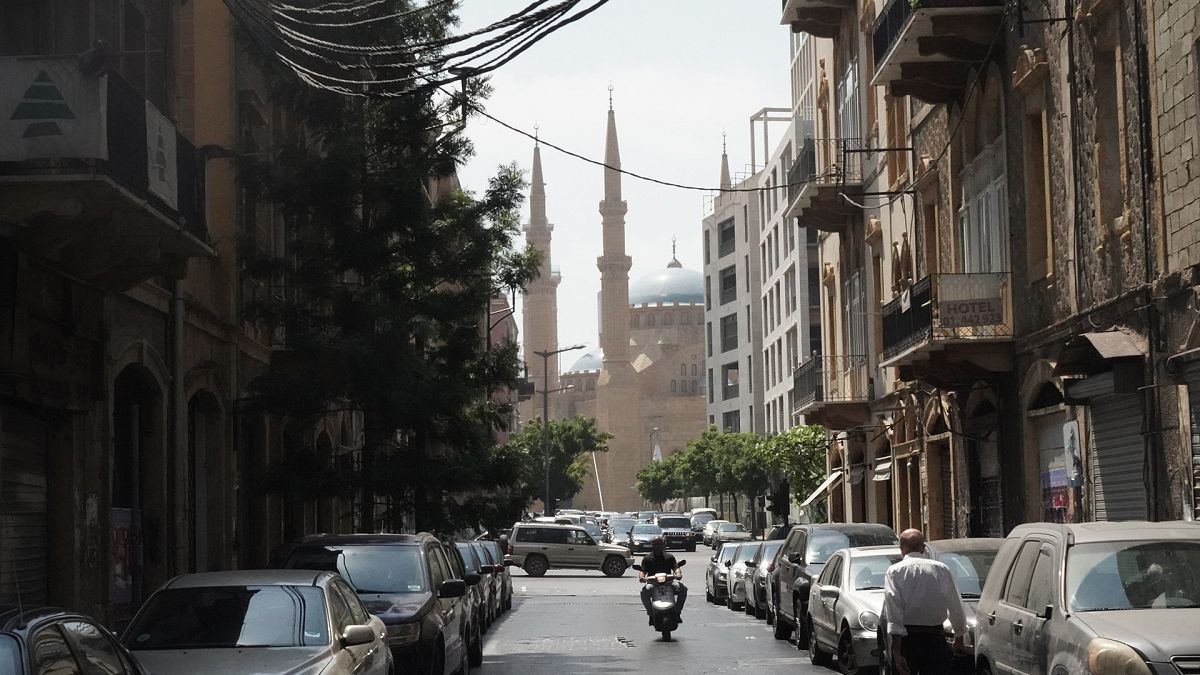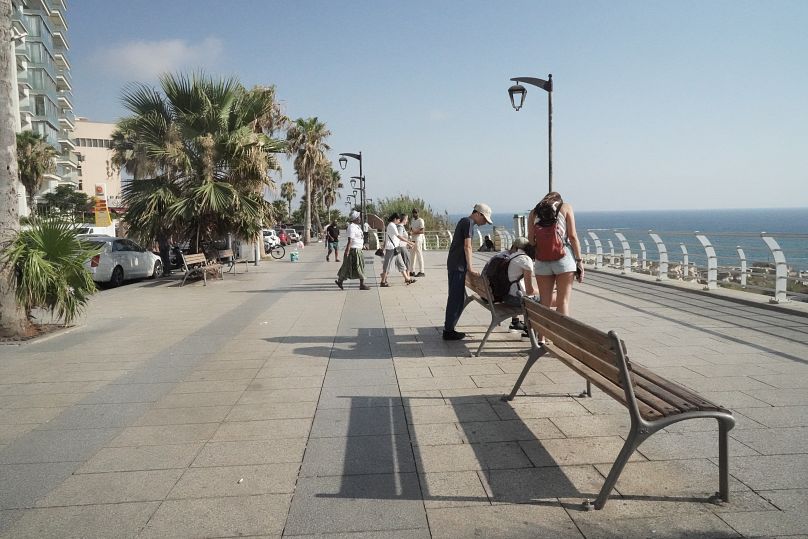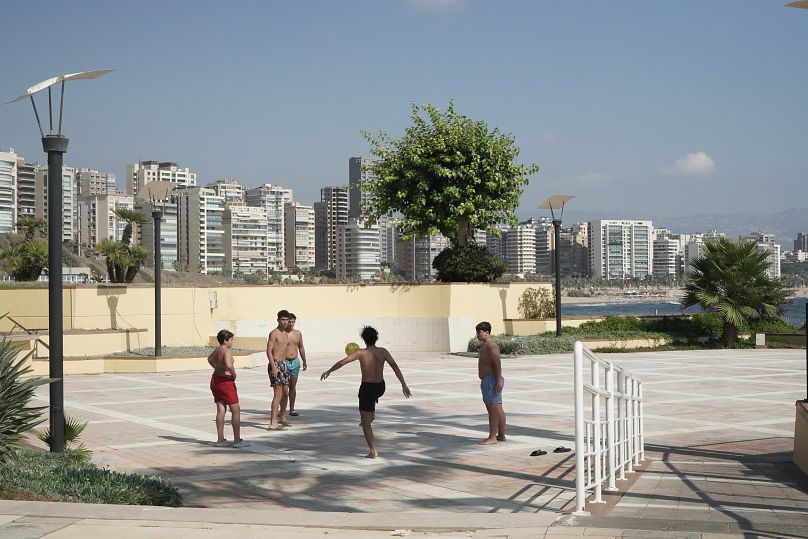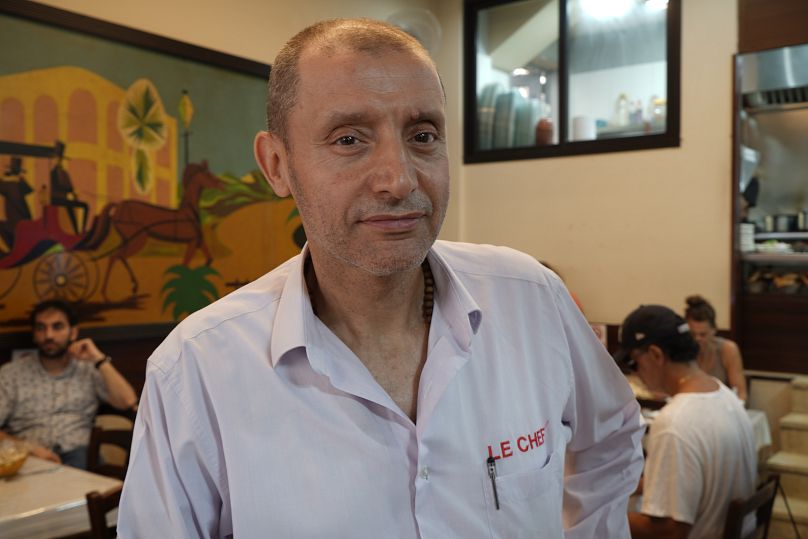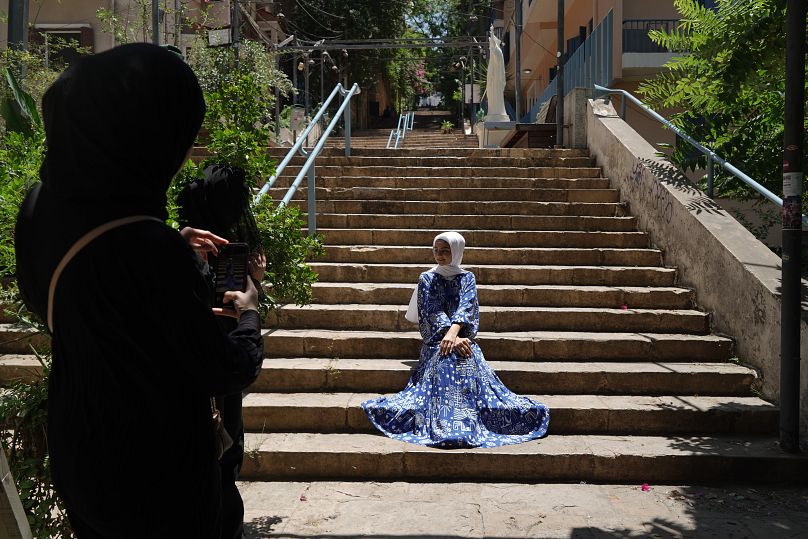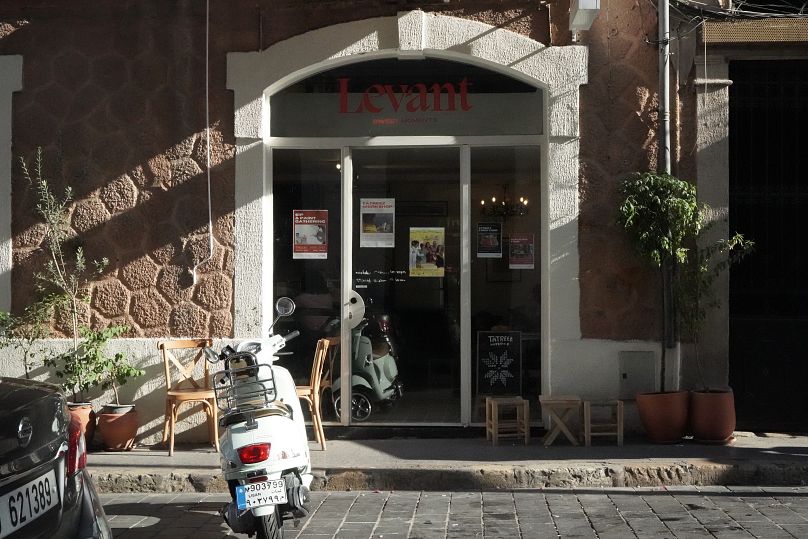As anxieties of a wider war in the Middle East loom, Euronews spoke to Beirut residents and experts to break down the latest events.
I hear a child's voice say, "On est arrivès au Liban” — we have arrived in Lebanon. I can picture the kid's smiling face peeking through a window as the Transavia flight touches down in Lebanon's capital, Beirut.
I am on the same plane. It’s mid-July, and it’s packed with families. Most of the passengers on board are Lebanese who emigrated to Europe, eager to return to their home country for summer holidays. But many things have changed since.
"We are here for 10 days to see our relatives, we also travelled to Europe. We are really good where we live now," says a young woman in her thirties, born in Tripoli and now living in Australia.
When asked if she left because of the ongoing tensions at the border, she adds, “It's a mix of things. The country's financial situation is a big part of it.”
Nobody was prepared for what would happen a few days later. The situation changes by the day, and developments are hard to keep up with.
Last Saturday, a rocket attack on the Druze town of Majdal Shams in Northern Israel killed 12 children, triggering Israel’s harsh response. Hezbollah was blamed, but the militant group denies any responsibility; many outsiders, including the EU foreign policy chief Josep Borrell, calling for an independent investigation.
The following Tuesday, Israel retaliated with a strike targeting one of Hezbollah’s top commanders, Fuad Shukr. The strike hit Beirut’s southern suburbs, specifically the area of Haret Hreik, known as Hezbollah’s stronghold.
Hundreds of flights in and out of Beirut have been cancelled in the last week, and embassies of different countries have issued warnings advising their citizens not to travel to the Lebanese capital.
I was already out of the country before flight disruptions kicked in, although I think of the family I met on that plane.
Will they be able to return safely to Australia? Where are they now?
'It's not a game, it's a serious situation'
It's about 8pm in Beirut, and I call my friend Mariam, who works in the capital as an Arabic language teacher.
“I am fine”, she told me, “but one of my uncles got injured in the explosion. I hope it’s nothing serious.”
At least five people have been killed in the attack on Haret Hreik, and several others are injured. Hezbollah has not yet confirmed the commander’s death, only that Shukr was in the building that got struck.
“After 20-25 years of non-stop military exchanges between Hezbollah, Hamas, Israel and others, they are aware now that this doesn't solve anything. None of them wants a full-fledged war,” says Rami Khouri, a fellow at the American University of Beirut.
But what if a wider war is being provoked by accident? “if Israel attacks Iranian positions, and the Iranians push back,” adds Khouri, “then you would have a wider and more dangerous confrontation. But I don't think it's going to happen."
"We saw a glimpse of that a few months ago when Iran attacked Israel. It was like a negotiated response, a very controlled one. Very few people died.
"It's not a game, it's a serious situation,” explains Khouri, also a journalist and author, ”but it's a theatrical one. It may or may not continue, but right now we are still in that phase in which we have scripted responses agreed upon by both sides.”
Fighting back memories of destruction and pain
I left Beirut a few days before Saturday’s attack in the Golan Heights with a very clear impression of how people, mainly residents and business owners, felt at the prospect of having to go through another war.
Their resilience, their sense of community, and their ability to live according to what each passing day brings were impressive.
But will they continue to feel this way? Always trying to strike a balance between past and present, fighting back the memories of the destruction and pain caused by previous wars?
Khouri believes that if the conflict expands across the region, there won’t be “a full war that destroys infrastructure and civilians like it happened in 2006”.
But anything can happen in such a fast-moving scenario.
A few hours after the attack in Southern Beirut, Hamas confirmed that its political leader, Ismail Haniyeh, had been killed in an Israeli attack in Tehran. In a matter of hours, two leaders in Iran’s network were targeted and gone.
Even before sifting through all the analysis pieces explaining the impact of what had happened, it was clear that the killing of Haniyeh in Iran was a tipping point.
Iran’s Supreme Leader Ayatollah Ali Khamenei promised “harsh punishment” for Israel, with the UN holding an emergency meeting — this just after a rise in optimism that Israel and Hamas were close to a ceasefire deal.
Suddenly, the situation started escalating.
“The prospect of not having a wider conflict is increasingly unrealistic. I say this because the actors have pushed themselves into a corner where, in order to preserve their deterrence positions, they have to act,” says Michael Young, an analyst specialising in Lebanon and an author.
“(Israel) would like to draw the US into a conflict with Iran,” he explains. “They tried to do it last April when they bombed the Iranian embassy in Damascus, creating a new dimension to the conflict.
"If the US intervenes, we must see how it will intervene. Will it do so in a defensive capacity, as we saw in April, or will it strike Iran and Iranian allies to prevent them from firing at Israel? This is where the risk lies."
According to Young, it’s almost impossible for Israel to fight Iran and its allies alone. They need the US. Yet, as he points out, “the US administration has no influence over Israel anymore. All I see is disarray in Washington.”
A full-out war could effectively destroy Lebanon, he warns. “It won’t be just economic; it will destroy society itself, and it would be very difficult to put the country back together again.”
'All we want is peace'
Having endured a 15-year civil war and a conflict between Israel and Hezbollah in 2006, Lebanon is used to juggling multiple crises. More recently, the country has been struggling to gather itself after the gargantuan port explosion that hit Beirut in 2020.
Lebanon is now facing one of its worst ever economic crises, one that has been exacerbated by the knock-on effect of the war in Ukraine. The country's GDP has fallen by 50%, and poverty now affects 80% of the population.
Pegging the value of the local currency to the US dollar as a much more stable currency partly eased inflation, but it’s now affecting the livelihoods of people who are paid in Lebanese pounds.
Tourism, traditionally one of the country’s leading economic sectors, has been badly hit.
I recall a taxi driver telling me, “There are no more tourists; they are gone.”
That pretty much mirrored the general mood I perceived when strolling around the city's well-known bohemian street, Rue Gouraud. Located right in the capital's historic centre, it is home to some of the best-known dining institutions in Beirut.
One of them is “Le Chef”. François Bassil opened the restaurant in 1967, and since then, it has become a living testimony of Lebanon’s history. It survived the 1975-1990 civil war and, not that long ago, the deadly port blast.
Charbel Bassil, François' son, who has taken over the business, greets every customer entering the restaurant.
It’s lunchtime, and the place is full. “We live by the day, and thankfully, we rely on the local clientele,” he says, “but all we want is peace and for tourists to come back. The business is now down by 80%.”
Lebanon's resilience on full display
As I leave “Le Chef”, I see a young model posing in front of the camera. She says she works as an influencer, and is 20 years old. Her name is Fatima and she is all smiles.
“The economic crisis is what really bothers us,” she says, ”but we carry on with our lives, we are resilient.”
The story of Joseph, whose bakery “Levant” only recently opened, shows a different side of the crisis. He started his business last autumn, just a few weeks before the war in Gaza began, having moved back to his native Lebanon after spending many years in France.
“At no point in time have I thought about reversing my decision, and I am aware of the risks,” Joseph says, adding that some of his employees have lost their homes and relatives to bombings in the south.
"The sense of community in Lebanon is something else,” he adds.
It’s true that the mix of cultures and different religious communities living together is among the country’s main attractions and charms, but political stability is a different story.
Not being able to overcome differences is what prevents the creation of a government that is credible to all Lebanese.
And now the prospect of an achievable truce in Gaza seems to have faded away. “We are paying the price for Netanyahu wanting to survive politically,” says Young. “He doesn’t want a ceasefire in Gaza; he has never wanted one.”
'See you in Beirut, whatever happens'
The focus this past Thursday, just a few hours after the killing of Hamas' top leader, Haniyeh, was on a speech by Hezbollah leader Hassan Nasrallah.
Behind his coded message might be the key to understanding the response of both Iran and Hezbollah to Israel’s latest attacks.
And the message could not be clearer. Many noticed a major shift from Nasrallah’s usual low-key tone over the past few weeks.
“Be happy for a short while and you will cry for a long one,” he said, addressing Israelis. “We have entered a new phase in all the fronts.”
Nasrallah emphasised that in his view, the attack on Beirut’s Southern suburbs was an act of aggression by Israel, not simply a “response”.
Some of his statements could be interpreted as hints at a plan to strike Israel in the same way Israel has hit Lebanon and Iran.
I immediately called Mariam and asked her whether the mood among her over the past few hours had changed.
“Yes,” she says confidently. “People are worried now, I am not going to lie.”
It seems that people are now on edge — and this is when I recall my exchange with Joseph, and his resilience and newfound happiness in Lebanon.
He told me that he would like the country to be remembered one day for something other than conflict. But most of all, the sticker at his café’s entrance comes to mind: “See you in Beirut, whatever happens.”












